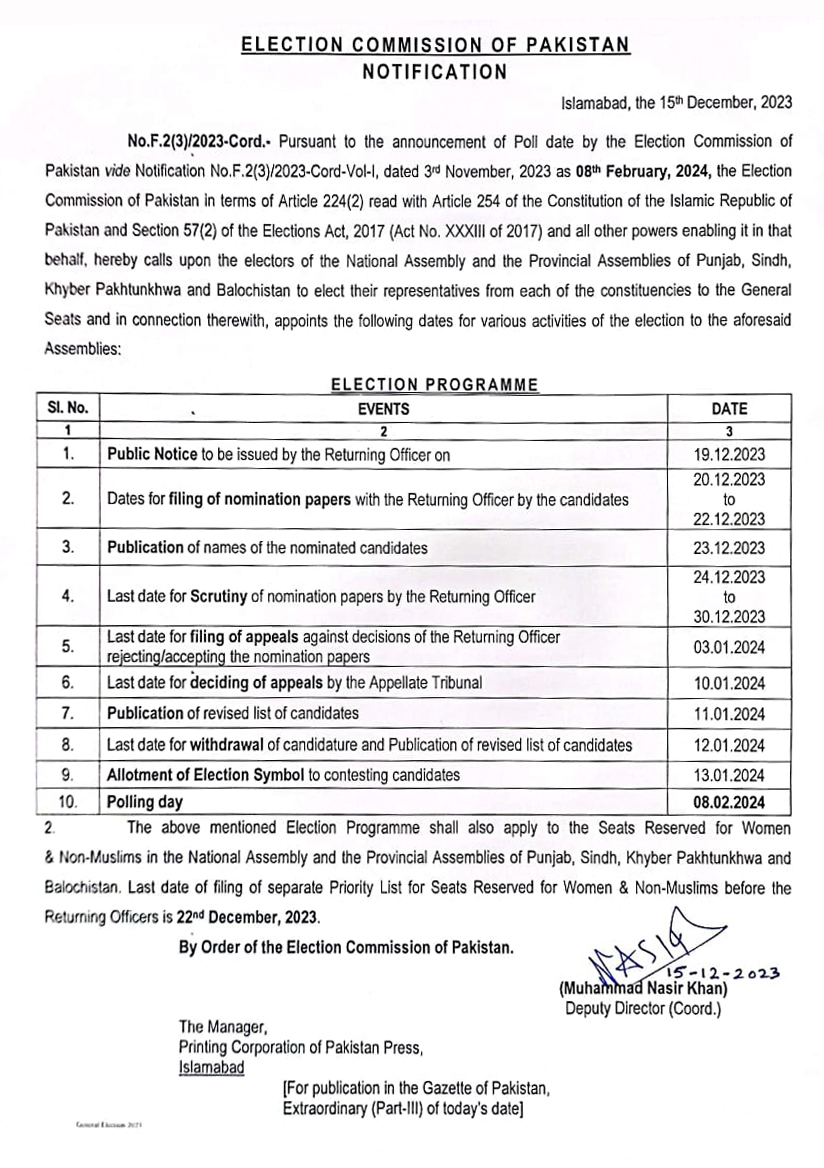Following the Supreme Court’s judgment, the Election Commission of Pakistan (ECP) published the long-awaited schedule for the general elections on February 8, 2024.
The polling process will begin four days from now, on December 19, when the returning officer (RO) will issue a public notification, and the ECP has also commenced training for ROs and district returning officers (DROs).
The election program also applies to reserved seats for women and non-Muslims in the national assembly as well as the four provincial assemblies of Punjab, Sindh, Khyber Pakhtunkhwa, and Balochistan.

The Election Commission of Pakistan (ECP) issued the long-awaited election schedule late at night, complying with the Supreme Court’s directives. However, a hiccup arose when the Lahore High Court (LHC) suspended the commission’s notification for the appointment of Returning Officers (ROs) and District Returning Officers (DROs) from the executive branch, defying the SC’s orders.
The LHC’s verdict, prompted by a petition from the Pakistan Tehreek-e-Insaf (PTI), the same party advocating timely polls in the Supreme Court, disrupted the polling process.
In response, Chief Justice Qazi Faez Isa and Chief Election Commissioner (CEC) Sikandar Sultan Raja convened with senior officials to ensure a smooth process. The commission filed a petition in the Supreme Court seeking the annulment of the LHC’s order, which was accepted, restoring the election process.
Concerns were raised by political parties about a potential delay in the elections, emphasizing the importance of timely polls for democracy. The ECP had previously refuted claims of potential delays, asserting the completion of all necessary preparations in a statement.
The election conundrum unfolded when President Alvi, upon the advice of then-Prime Minister Shehbaz Sharif, dissolved the 15th National Assembly three days before its 5-year term completion.
The lower house dissolution aimed to schedule elections 90 days later, as per the Constitution. However, the ECP faced challenges in meeting the 90-day deadline due to the need for fresh delimitation of constituencies after the Council of Common Interests (CCI) approved the results of the 2023 digital census.
The ECP, under CEC Sikandar Sultan Raja, announced in October that the polls would take place in January of the following year, without specifying the exact date, leading to criticism.
In response to the ECP’s decision to hold polls beyond the constitutional deadline, the PTI and others filed a plea in the Supreme Court. The SC directed the ECP and the president to consult, resulting in a consensus date of February 8.
Despite this consensus, concerns persisted among political parties, fearing potential delays as the election schedule remained unannounced. PPP co-chairperson Asif Ali Zardari expressed that an “eight to 10 days” delay in the general elections would make no difference.






